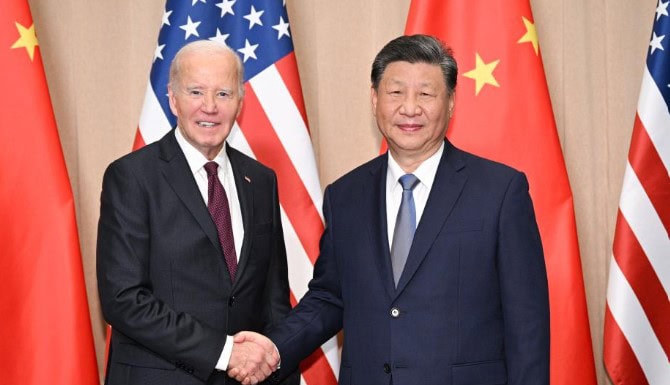LIMA – Chinese President Xi Jinping and US President Joe Biden interacted at 31st APEC Economic Leaders’ Meeting in Lima, Peru, where the duo discussed ways to stabilize and strengthen bilateral relations amid growing global challenges.
During the meeting, President Xi acknowledged the ups and downs over the past four years in Washington-Beijing’s ties, there have been significant strides in dialogue and cooperation, leading to a largely stable relationship. Both leaders highlighted the positive impact of communication mechanisms that have been re-established or newly formed, covering areas such as diplomacy, trade, climate change, and people-to-people exchanges.
Xi outlined several key principles that have guided their engagement, emphasizing that the China-US relationship should be based on mutual respect, peaceful coexistence, and shared benefits. He called for a rejection of the “Thucydides Trap” theory, which suggests that rising powers inevitably clash with established ones, and reiterated that a new Cold War would be detrimental to both countries and the world.
In a broad-ranging discussion, Xi identified seven key lessons from their interactions over the past years, including the importance of aligning words with actions, respecting each other’s core interests, and expanding cooperation in critical areas such as artificial intelligence (AI) and climate change.
He further stressed the need to avoid actions that could worsen tensions, particularly on issues like Taiwan, human rights, and cybersecurity. He reiterated China’s stance on Taiwan, calling for U. support in opposing “Taiwan independence” and underlining that peace across the Taiwan Strait is non-negotiable.
Biden reaffirmed US commitment to a stable and constructive relationship with China. He emphasized that the US does not seek a new Cold War, nor does it intend to change China’s political system. Biden reiterated the US’s firm commitment to the One-China policy and expressed the need for continued dialogue and cooperation to responsibly manage their differences.
Both leaders also discussed progress in areas of mutual interest, such as counternarcotics, climate change, AI, and people-to-people exchanges. Biden highlighted the importance of maintaining open communication channels between the two countries to prevent conflict and foster cooperation on global issues.
The meeting concluded with both presidents reiterating their shared responsibility to promote peace and stability in the world. They agreed to continue working together to manage competitive aspects of the relationship while ensuring the long-term stability of China-US ties.










